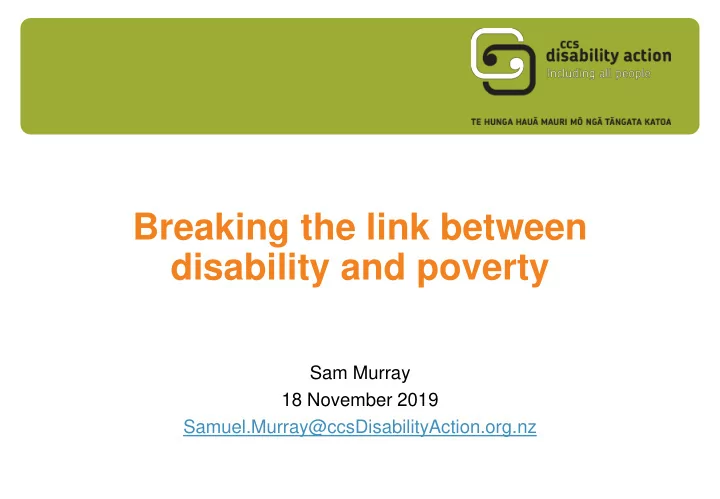

Breaking the link between disability and poverty Sam Murray 18 November 2019 Samuel.Murray@ccsDisabilityAction.org.nz
Breaking the link between disability and poverty Key ideas • There is nothing inevitable about disability-related inequality. • It can be dramatically reduced with the right income support and the removal of barriers to education, employment, and the community. • There is considerable diversity within the disability community.
Breaking the link between disability and poverty Disability inequality affects almost a third of children In the United Kingdom 2017/18 Family Resources Survey: • 8% of all children were disabled children. • 31% of children lived in a family where at least one immediate family member was a disabled person. • 23% of children had a disabled parent. An often overlooked group. In 2013, there were between 123,000 and 164,000 disabled children and young people aged under 20 in New Zealand.
Breaking the link between disability and poverty Households under three poverty measures (before tax and housing costs) 30% 27.8% 25% 19.4% 20% 17.7% 15% 13.9% 13.3% 13.0% 11.5% 9.6% 10% 5.7% 5% 4.0% 4.0% 2.3% 0% New Zealand households New Zealand all United Kingdom United Kingdom all with disabled children households with children households with disabled households with children children 39.2% of median household income 47% of median household income 62.7% of median household income
Breaking the link between disability and poverty We need to increase disability allowances • In 2018, the median payment rate for disability allowances for children in the United Kingdom was 3.2 times higher than in New Zealand. • Adjusting for differences in GDP per person, the United Kingdom disability allowances are still 2.8 times higher. • There are also disability specific tax credits in the United Kingdom. • In New Zealand, only 7% of children receiving a disability-related allowance, receive both types (Child Disability Allowance and Disability Allowance).
Breaking the link between disability and poverty People reporting the adequacy of their income to buy everyday items 100% 8.5% 8.5% 19.0% 19.1% 90% 80% 29.0% 29.8% 70% 35.2% 60% 43.8% 50% 37.7% 42.6% 40% 30% 32.6% 27.2% 20% 24.9% 10% 20.2% 13.2% 10.0% 0% Disabled people 15 to 64 Non-disabled people 15 to Carers of disabled children All parents with dependent 64 children Not enough money Only just enough money Enough money More than enough money
Breaking the link between disability and poverty We need to fix inequitable support options • Disability-related support does not always work for lower income and one- parent households as well as Maori and Pacific peoples • For example, Carer Support only provides a subsidy at less than the minimum wage. 66% of carers reported using their own money to make up the difference. • Often disabled children are given less than 20 hours of education support worker time, preventing the full use of 20 hours free ECE. • We need to reduce barriers to access and switch to more flexible support options, including using cash transfers over subsidies and invoicing systems.
Breaking the link between disability and poverty We need to respond to the growing diversity of disability The ethnicity of new entrants receiving ORS by percentage 60% 57.0% 50% 40% 37.7% 28.8% 2009 30% 2018 20.0% 20% 13.8% 11.6% 9.2% 9.0% 10% 4.5% 3.7% 2.9% 2.0% 0% European/Pākehā Māori Asian Other Pacific peoples Unknown
Breaking the link between disability and poverty We need to address inequity within the disability community Child Disability Allowance by ethnicity and carer benefit status 100% 1.1% 1.8% 2.5% 3.1% 2.9% 4.6% 11.3% 10.0% 10.8% 10.1% 90% 80% 32.0% 70% 45.3% 60% 59.0% 64.0% 1.6% 83.6% 50% 1.6% 40% 30% 1.0% 53.1% 0.7% 41.3% 20% 26.7% 22.9% 10% 0.6% 8.1% 0% European/Pākehā Māori Other Pacific peoples Unspecified Main Benefit Super and Veteran No Benefit Non-beneficiary assistance Orphan and unsupported child
Breaking the link between disability and poverty Inequality persists for disabled students Students by decile of school in 2009 and 2018 100% 2.5% 6.7% 11.7% 14.1% 8.5% 1.6% 90% 27.1% 27.0% 16.2% 80% 13.3% 29.0% 37.7% 70% 20.4% 22.6% 60% 23.5% 29.3% 50% 35.8% 20.5% 18.8% 40% 38.9% 28.6% 30% 27.0% 16.7% 16.8% 20% 24.2% 10% 20.0% 16.3% 15.3% 15.3% 14.7% 0% 2009 2018 2009 2018 2009 2018 All students receiving ORS Students receiving ORS at special schools All students Decile 1 & 2 Decile 3 & 4 Decile 5 & 6 Decile 7 & 8 Decile 9 & 10
Contact Sam Murray National Policy Coordinator 027 273 7762 Samuel.Murray@ccsDisabilityAction.org.nz www.Facebook.com/ccsDisabilityAction www.Twitter.com/ccsDisabilityA http://nzlinkedin.com/company/ccs-disability-action www.ccsDisabilityAction.org.nz Registered Charity Number: CC30070
Recommend
More recommend